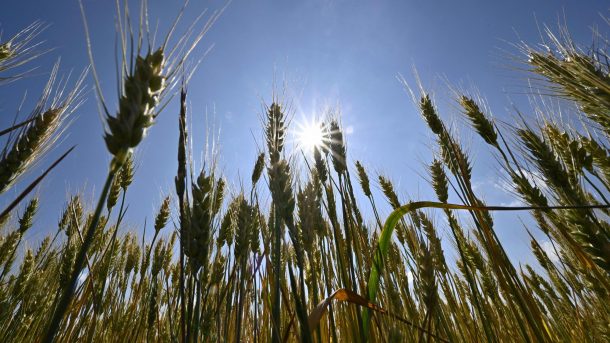RUSSIA’S vicious and unlawful invasion of Ukraine is causing serious disruption in agriculture across Europe, a sector which relies heavily on Russian fertilisers.
Farmers who gave up the traditional model of raising both arable and livestock lang syne are looking again at introducing a mix to their land or doing “straw for dung” deals with neighbours.
In the middle of this, a niche group of producers are quietly entering the mainstream: Scotland’s Organic Stakeholders Group (SOSG) has launched an ambitious and, they say, achievable plan to embed organic food and drink into our food systems.
“There is huge potential in the market. The organic standard is legally binding so it is a brand you can trust,” says Ross Paton, Chair of SOSG and a dairy farmer with a whopping 900 acres of clover-laden, biodiverse farmland near Castle Douglas. “We are always trying to find new ways of doing things, using natural processes with innovative technologies.”
READ MORE: Keir Starmer hit with resignation as Mike Amesbury steps down from shadow cabinet
Ross is keen to emphasise the importance of Scotland maintaining convergence with the EU, meaning we stay aligned with the European Union’s standards and policies, crucial for keeping that important export market.
The EU has set a target of at least 25% of its agricultural land to be farmed organically by 2030 and has produced an action plan which describes organic farmers as “the pioneers of the sustainable agriculture of the future”.
For those of us keen to see Scotland become a member of the European Union again, it is encouraging too that the Scottish Government seems to be taking the idea seriously.
The initiative was launched at the Royal Highland Show with many of Scotland’s leading industry professionals taking a close interest. Scotland Food & Drink committed to incorporating organics into their upcoming strategy, Ambition 2030, and the Scottish Government spoke of the SOSG report being a great foundation for a next action plan for organics.
“We recognise the crucial role that organic farming methods play in our drive towards nature restoration and a resilient rural economy,” a Scottish Government spokesperson said.
‘WE are committed to seeing more organic farming and organic produce for sale in Scotland and are working with the sector to establish a new Organic Food and Farming Action Plan.
“We are continuing to invest through the Agri-Environment Climate Scheme (AECS) and have already made £30 million available. Within AECS, we aim to support farmers and groups of farmers to convert their land to organic status and maintain organic farming methods throughout the country. This will assist in delivering increased biodiversity, improved soils and contribute to mitigating climate change at the same time as providing high quality, locally produced food.”

It is the importance of feeding communities in sustainable ways which drives Antonia Ineson, a small-scale market gardener at Myreside Organics, in Perthshire, where she grows fresh produce in a field bursting with biodioversity.
“I would like to see cities encircled by rings of market gardens providing local food in season. There will always be a need for some imports, but we need a systems change where we develop Scottish organic production, the supply chain, and the market in step,” Antonia explains.
Procurement schemes have shown it is possible for local authorities in Scotland to provide organic food at the same prices as that produced conventionally, but price parity is a distant dream for those of us who rely on the supermarkets.
However, organic veg box schemes can be found across much of Scotland, delivering fresh local produce to your door which often lasts better and can be cheaper than similar supermarket options. We might not be able to change our nation’s food system overnight, but we can, perhaps, change the way we shop.
Ruth Watson is the founder of the Keep Scotland the Brand campaign.
We know there are thousands of National readers who want to debate, argue and go back and forth in the comments section of our stories. We’ve got the most informed readers in Scotland, asking each other the big questions about the future of our country.
Unfortunately, though, these important debates are being spoiled by a vocal minority of trolls who aren’t really interested in the issues, try to derail the conversations, register under fake names, and post vile abuse.
So that’s why we’ve decided to make the ability to comment only available to our paying subscribers. That way, all the trolls who post abuse on our website will have to pay if they want to join the debate – and risk a permanent ban from the account that they subscribe with.
The conversation will go back to what it should be about – people who care passionately about the issues, but disagree constructively on what we should do about them. Let’s get that debate started!
Callum Baird, Editor of The National
We want our comments to be a lively and valuable part of our community – a place where readers can debate and engage with the most important local issues. The ability to comment on our stories is a privilege, not a right, however, and that privilege may be withdrawn if it is abused or misused.
Please report any comments that break our rules.
This website and associated newspapers adhere to the Independent Press Standards Organisation’s Editors’ Code of Practice. If you have a complaint about the editorial content which relates to inaccuracy or intrusion, then please contact the editor here. If you are dissatisfied with the response provided you can contact IPSO here
© 2001-2022. This site is part of Newsquest’s audited local newspaper network. A Gannett Company. Newsquest Media Group Ltd, Loudwater Mill, Station Road, High Wycombe, Buckinghamshire. HP10 9TY. Registered in England & Wales | 01676637 |
Data returned from the Piano ‘meterActive/meterExpired’ callback event.
As a subscriber, you are shown 80% less display advertising when reading our articles.
Those ads you do see are predominantly from local businesses promoting local services.
These adverts enable local businesses to get in front of their target audience – the local community.
It is important that we continue to promote these adverts as our local businesses need as much support as possible during these challenging times.
Halt on Russian fertilisers creates opportunity for Scottish organic farmers – The National





